Unit 3 Where did you go? 第一课时复习课件(43张PPT)
文档属性
| 名称 | Unit 3 Where did you go? 第一课时复习课件(43张PPT) | 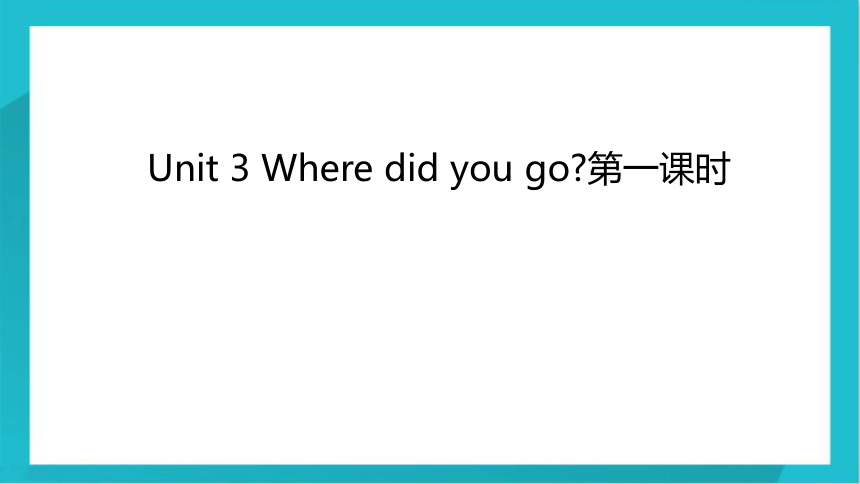 | |
| 格式 | zip | ||
| 文件大小 | 1.6MB | ||
| 资源类型 | 教案 | ||
| 版本资源 | 人教版(PEP) | ||
| 科目 | 英语 | ||
| 更新时间 | 2019-05-18 07:28:20 | ||
图片预览

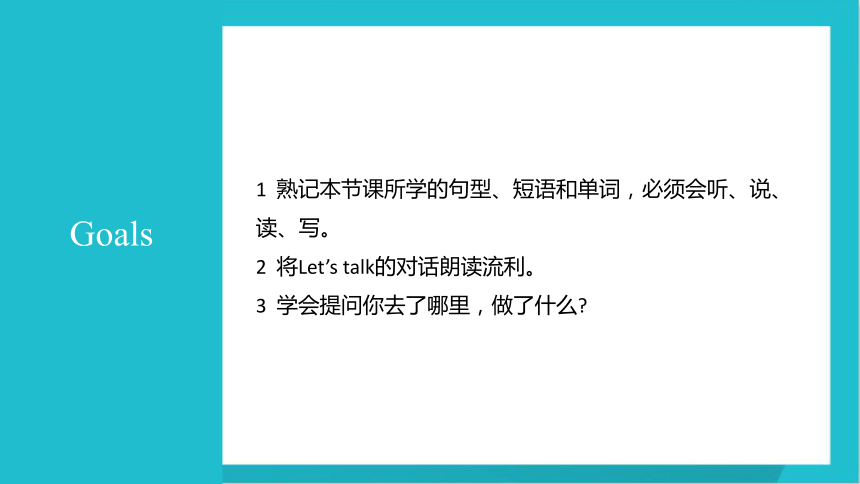
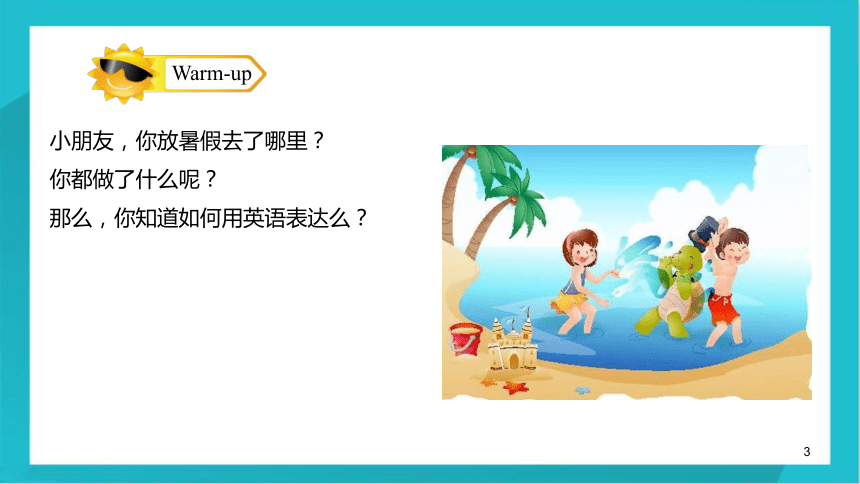
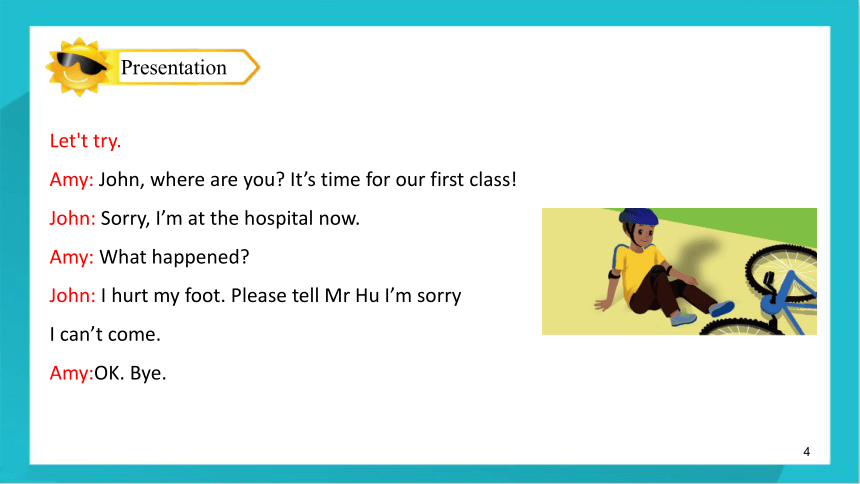
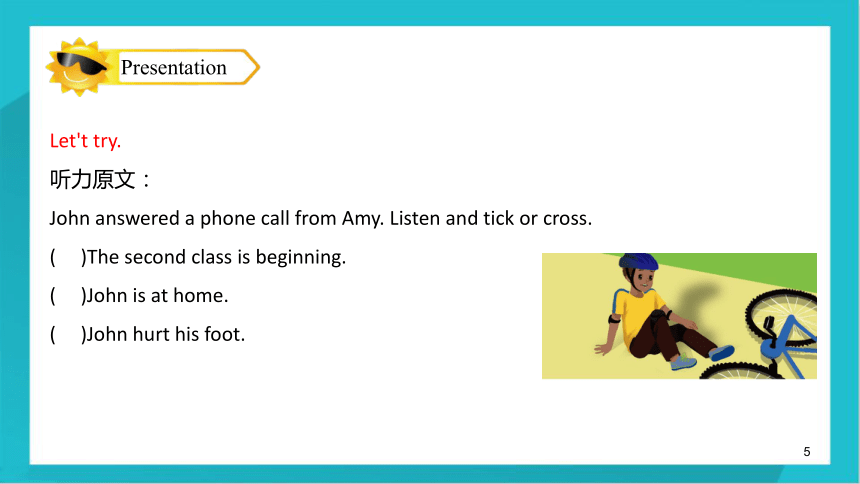
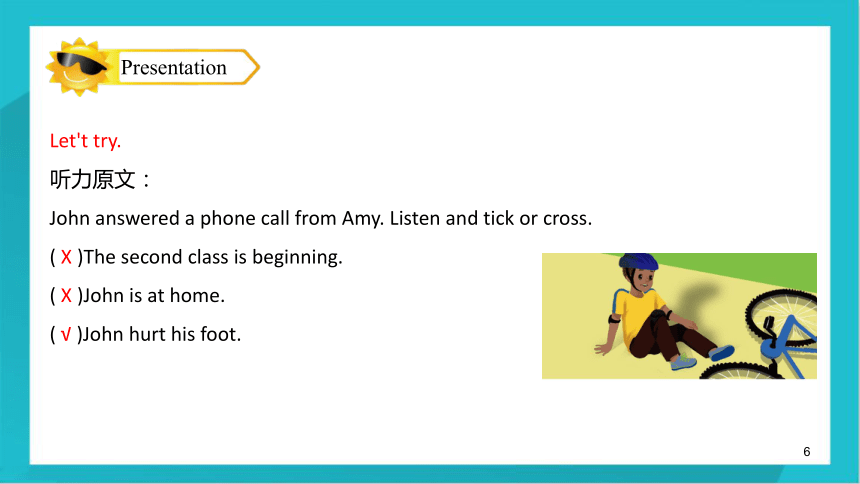
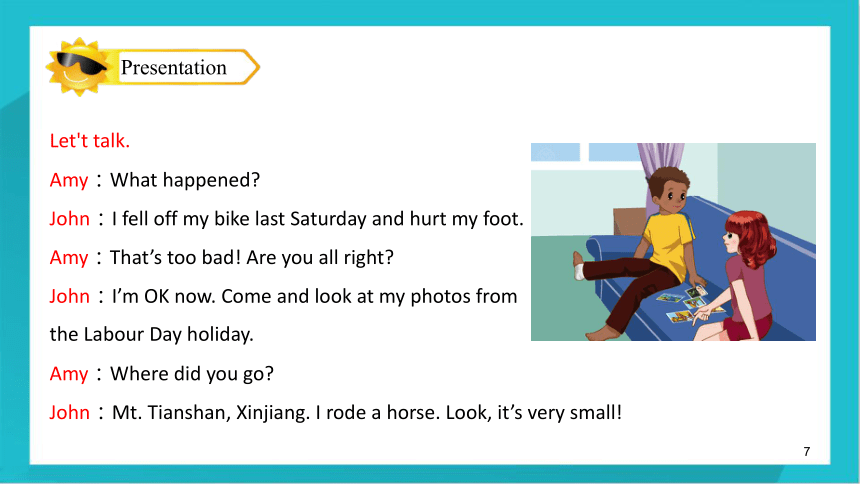
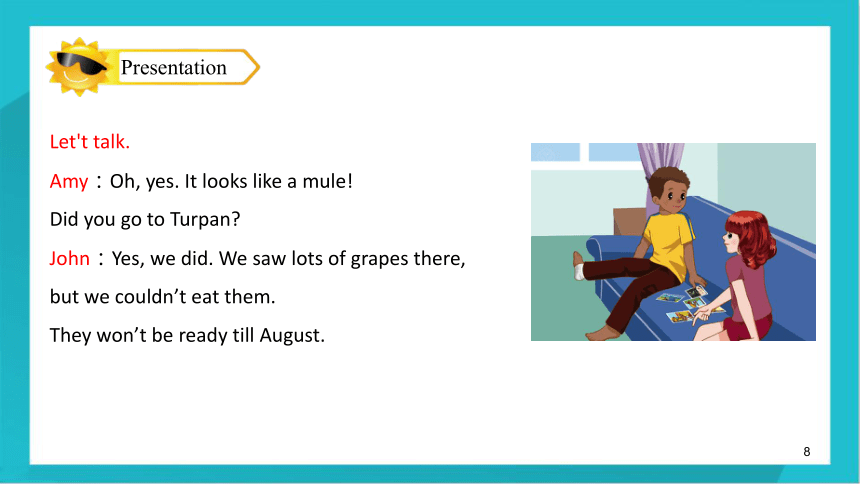
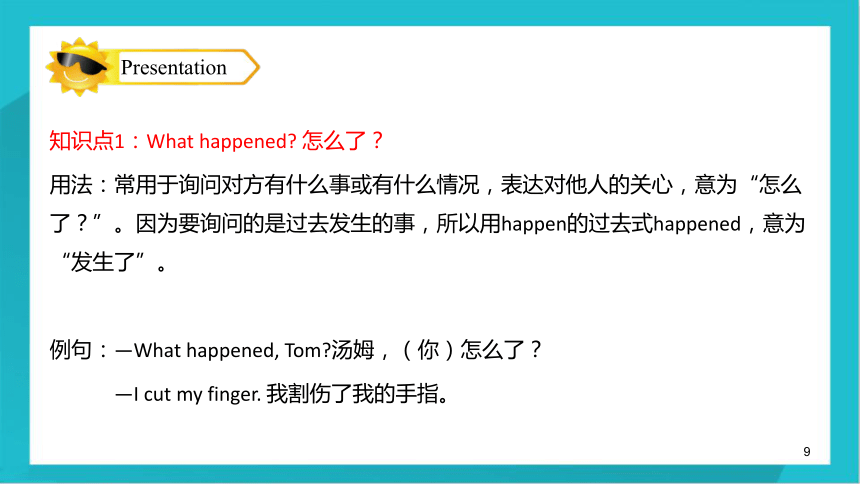
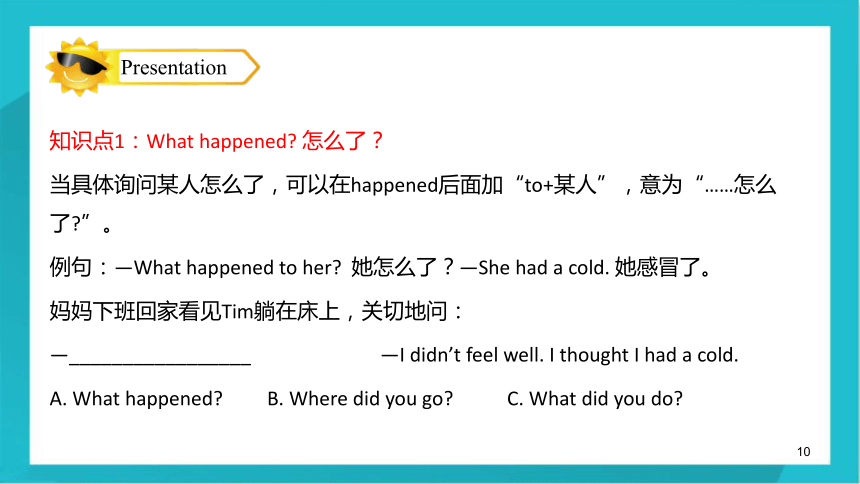
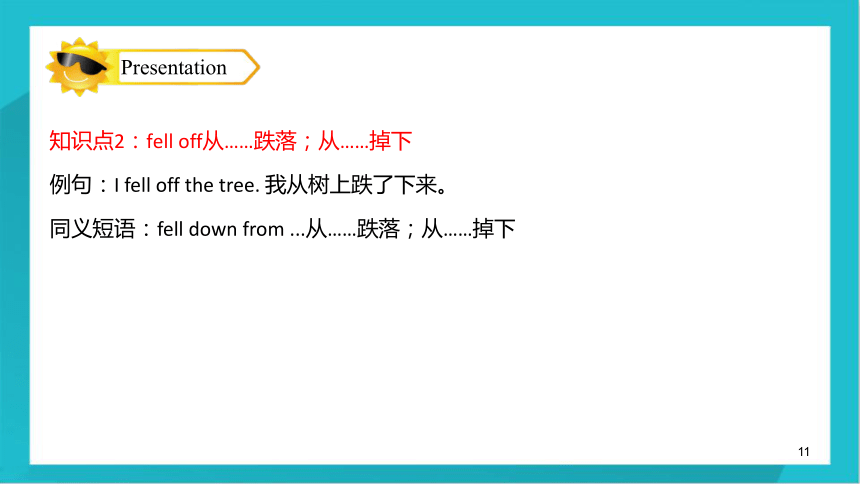
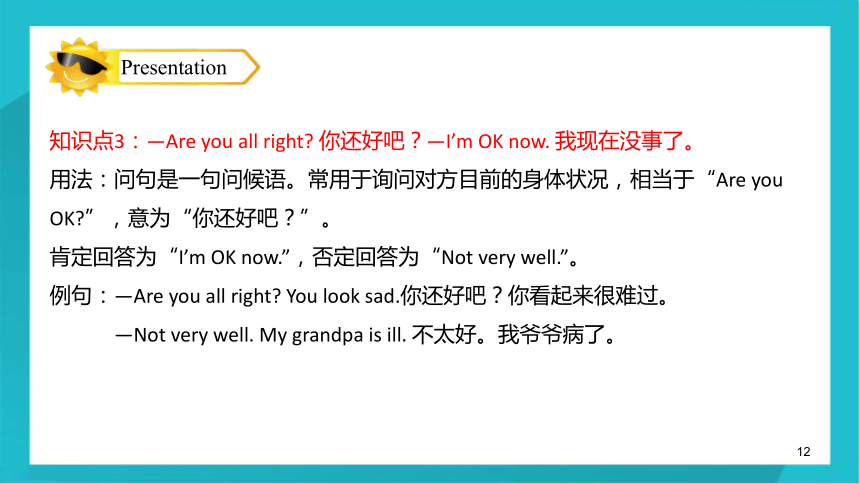
文档简介
Unit 3 Where did you go?第一课时
1 熟记本节课所学的句型、短语和单词,必须会听、说、读、写。
2 将Let’s talk的对话朗读流利。
3 学会提问你去了哪里,做了什么?
Goals
小朋友,你放暑假去了哪里?
你都做了什么呢?
那么,你知道如何用英语表达么?
null
Warm-up
Let't try.
Amy: John, where are you? It’s time for our first class!
John: Sorry, I’m at the hospital now.
Amy: What happened?
John: I hurt my foot. Please tell Mr Hu I’m sorry
I can’t come.
Amy:OK. Bye.
null
Presentation
Let't try.
听力原文:
John answered a phone call from Amy. Listen and tick or cross.
( )The second class is beginning.
( )John is at home.
( )John hurt his foot.
null
Presentation
Let't try.
听力原文:
John answered a phone call from Amy. Listen and tick or cross.
( X )The second class is beginning.
( X )John is at home.
( √ )John hurt his foot.
null
Presentation
Let't talk.
Amy:What happened?
John:I fell off my bike last Saturday and hurt my foot.
Amy:That’s too bad! Are you all right?
John:I’m OK now. Come and look at my photos from the Labour Day holiday.
Amy:Where did you go?
John:Mt. Tianshan, Xinjiang. I rode a horse. Look, it’s very small!
null
Presentation
Let't talk.
Amy:Oh, yes. It looks like a mule!
Did you go to Turpan?
John:Yes, we did. We saw lots of grapes there,
but we couldn’t eat them.
They won’t be ready till August.
null
Presentation
知识点1:What happened? 怎么了?
用法:常用于询问对方有什么事或有什么情况,表达对他人的关心,意为“怎么了?”。因为要询问的是过去发生的事,所以用happen的过去式happened,意为“发生了”。
例句:—What happened, Tom?汤姆,(你)怎么了?
???—I cut my finger. 我割伤了我的手指。
null
Presentation
知识点1:What happened? 怎么了?
当具体询问某人怎么了,可以在happened后面加“to+某人”,意为“……怎么了?”。
例句:—What happened to her? 她怎么了?—She had a cold. 她感冒了。
妈妈下班回家看见Tim躺在床上,关切地问:
—_________________??????—I didn’t feel well. I thought I had a cold.
A. What happened? B. Where did you go? C. What did you do?
null
Presentation
知识点2:fell off从……跌落;从……掉下
例句:I fell off the tree. 我从树上跌了下来。
同义短语:fell down from ...从……跌落;从……掉下
null
Presentation
知识点3:—Are you all right? 你还好吧?—I’m OK now. 我现在没事了。
用法:问句是一句问候语。常用于询问对方目前的身体状况,相当于“Are you OK?”,意为“你还好吧?”。
肯定回答为“I’m OK now.”,否定回答为“Not very well.”。
例句:—Are you all right? You look sad.你还好吧?你看起来很难过。
???—Not very well. My grandpa is ill. 不太好。我爷爷病了。
null
Presentation
知识点4:Labour Day 劳动节
例句:I had a good time over my Labour Day holiday.
???我在我的劳动节假期中过得很愉快。
同义表达:May Day
null
Presentation
知识点5:中外节日拓展
一、西方盛行节日:
Thanksgiving Day 感恩节Christmas Day 圣诞节
Father’s Day 父亲节 Mother’s Day 母亲节
二、中国传统节日:
Spring Festival 春节 Lantern Festival 元宵节
Dragon Boat Festival 端午节Mid-Autumn Festival 中秋节
null
Presentation
知识点6:Where did you go?你去哪儿了?
用法及答语:这是一个由where引导的一般过去时的特殊疑问句,句型是:Where did +主语+ go(+过去时间)?用来询问某人过去去了哪里。
答语句型:(主语+ went to+) 地点.
例句:—Where did she go this morning? 今天上午她去了哪里?
???—She went to the bookstore.她去了书店。
null
Presentation
由句中的助动词did可知句子的时态是一般过去时,后面的动词要用原形。
—Where did Lingling ?? over her holiday?
—She went to Hainan.
?A. goes???B. went???C. go
null
Practice
知识点7:It looks like a mule!它看起来像一头骡子!
mule /mju?l/ n. 骡子
例句:He would like to buy another mule.
他想买另一头骡子。
发音:字母u在单词中发/ ju?/。?复数:mules
null
Presentation
知识点8:look like的用法
look like是动词短语,意为“看起来像”。like在这里是介词,意为“像”,后面可以接名词或代词。
例句:He looks like his father.他看起来像他的父亲。
be like意为“像……”,常用于询问某人的外貌或性格。
例句:—What’s he like? 他是什么样子的?
—He’s tall and thin. 他又高又瘦。
null
Presentation
知识点9: could /k?d/ modal v. 能
例句:He could run very fast before.
???他以前跑得很快。
could是can的过去式,后接动词原形。
null
Presentation
知识点10:They won’t be ready till August. 它们直到八月才成熟。
till /t?l/ prep.& conj. 直到
例句:Just wait till you see it. 你就等着直到看见它吧。
not ... till ...的用法:这是一个常见结构,常用于口语中,表示“直到……才……”,相当于“not ... until ... ”。
例句:He didn’t go to bed till 11:30 p.m.
???他直到晚上11点半才去睡觉。
null
Presentation
Answer the question.
Where did John go over his holiday?
What did he do?
null
Practice
Answer the question.
Where did John go over his holiday?
Mt. Tianshan, Xinjiang.
What did he do?
He rode a horse and saw lots of grapes.
null
Practice
Have a think:
Where did you go over your holiday?
_________________________________.
What did you do?
_________________________________.
null
Practice
null
Let's learn.
Presentation
假期活动短语(过去式)【四会】
rode a horse骑马?
rode a bike骑自行车
rode /r??d/ v. (ride的过去式)骑(马;自行车)
例句:He rode a bike yesterday.
昨天他骑了自行车。
null
Presentation
went camping 去野营 ?
went fishing 去钓鱼
went /went/ v. (go的过去式)去
例句:He went home at 5 yesterday.
他昨天5点回的家。
null
Presentation
camp /k?mp/ v. 野营
例句:They camped under the tree yesterday.昨天他们在树下面野营了。
动词ing形式:camping
形近词:lamp灯?戴着cap(帽子) 点着lamp(灯) 去camp(野营)
null
Presentation
fish /f??/ v. 钓鱼
例句:You can fish in this river.?
你可以在这条河里钓鱼。
形近词:dish 盘?wish 希望
null
fish
不可数名词 鱼肉
可数名词
表示“鱼”且强调鱼的条数时,单复数同形。two fish两条鱼
表示“鱼”且强调鱼的种类时,复数形式为fishes。two fishes两种鱼
Presentation
hurt my foot 我的脚受伤了
hurt /h??t/ v. (hurt的过去式)(使)受伤
例句:I hurt my leg yesterday.
昨天我腿受伤了。
短语:get hurt受伤
null
Presentation
下列动词的过去式与原形一样,我们可以把它们放在一起记忆。
hurt — hurt
put — put
cut — cut
let — let
read /ri?d/ — read /red/(读音不同)
null
Presentation
hurt 过去式与原形相同。
null
Listen,answer and write.
Presentation
Listen,answer and write.
听力原文:
1. Carl: I went camping yesterday and hurt my foot.
2. Meimei: Yesterday was my 12th birthday. I got a new bike and I rode it for the whole day.
3. Boy: Mr Guo is my father’s friend. Yesterday my father and Mr Guo went fishing and rode horses.
null
Presentation
null
Listen,answer and write.
Presentation
went camping yesterday
hurt his foot
got a new bike and rode
it for the whole day
went fishing
rode horses
一、单项选择。
( ) 1. He ________off his bike last Saturday.
A. fall B. falls C. fell
( ) 2. She couldn’t ________ grapes.
A. eat B. ate C. eats
( ) 3. Tom ________ a horse and ________his foot.
A.rides; hurt B. rode; hurts C. rode; hurt
null
Practice
一、单项选择。
( C ) 1. He ________off his bike last Saturday.
A. fall B. falls C. fell
( A ) 2. She couldn’t ________ grapes.
A. eat B. ate C. eats
( C ) 3. Tom ________ a horse and ________his foot.
A.rides; hurt B. rode; hurts C. rode; hurt
null
Practice
一、单项选择。
( ) 4. This horse ________ a mule.
A. looks for B. looks like C. looks after
( ) 5. Did your father ________ yesterday?
A. went fishing B. go fishing C. go fish
null
Practice
一、单项选择。
( B ) 4. This horse ________ a mule.
A. looks for B. looks like C. looks after
( B ) 5. Did your father ________ yesterday?
A. went fishing B. go fishing C. go fish
null
Practice
二、选词填空。
A. over B. photos C. saw D. went E. happened
( ) 1. They ________to a forest park.
( ) 2. What ________?
( ) 3. Come and look at my________.
( ) 4. He ________lots of grapes.
( ) 5. I went to Xinjiang ________ my holiday.
null
Practice
二、选词填空。
A. over B. photos C. saw D. went E. happened
( D ) 1. They ________to a forest park.
( E ) 2. What ________?
( B ) 3. Come and look at my________.
( C ) 4. He ________lots of grapes.
( A ) 5. I went to Xinjiang ________ my holiday.
null
Practice
三、连词成句。
1. go, Saturday, where, you, last, did(?)
2. bike, rode, John, a, yesterday(.)
3. did, night, what, she, do, last(?)
4. brother, camping, weekend, went, my, last(.)
null
Practice
三、连词成句。
1.Where did you go?
2. John rode a bike yesterday.
3. What did she do last night?
4. My brother went camping last weekend.
null
Practice
What happened?
2. 询问你去了哪里:
Where did you go?
1. 询问发生了什么?
小结
1.按照正确的语音、语调朗读课文对话。
2.和你的朋友一起,聊一聊放假的时候做了什么?
(聊天过程中注意运用本课所学句型进行对话)
3. 预习下一课时part B
Homework
1 熟记本节课所学的句型、短语和单词,必须会听、说、读、写。
2 将Let’s talk的对话朗读流利。
3 学会提问你去了哪里,做了什么?
Goals
小朋友,你放暑假去了哪里?
你都做了什么呢?
那么,你知道如何用英语表达么?
null
Warm-up
Let't try.
Amy: John, where are you? It’s time for our first class!
John: Sorry, I’m at the hospital now.
Amy: What happened?
John: I hurt my foot. Please tell Mr Hu I’m sorry
I can’t come.
Amy:OK. Bye.
null
Presentation
Let't try.
听力原文:
John answered a phone call from Amy. Listen and tick or cross.
( )The second class is beginning.
( )John is at home.
( )John hurt his foot.
null
Presentation
Let't try.
听力原文:
John answered a phone call from Amy. Listen and tick or cross.
( X )The second class is beginning.
( X )John is at home.
( √ )John hurt his foot.
null
Presentation
Let't talk.
Amy:What happened?
John:I fell off my bike last Saturday and hurt my foot.
Amy:That’s too bad! Are you all right?
John:I’m OK now. Come and look at my photos from the Labour Day holiday.
Amy:Where did you go?
John:Mt. Tianshan, Xinjiang. I rode a horse. Look, it’s very small!
null
Presentation
Let't talk.
Amy:Oh, yes. It looks like a mule!
Did you go to Turpan?
John:Yes, we did. We saw lots of grapes there,
but we couldn’t eat them.
They won’t be ready till August.
null
Presentation
知识点1:What happened? 怎么了?
用法:常用于询问对方有什么事或有什么情况,表达对他人的关心,意为“怎么了?”。因为要询问的是过去发生的事,所以用happen的过去式happened,意为“发生了”。
例句:—What happened, Tom?汤姆,(你)怎么了?
???—I cut my finger. 我割伤了我的手指。
null
Presentation
知识点1:What happened? 怎么了?
当具体询问某人怎么了,可以在happened后面加“to+某人”,意为“……怎么了?”。
例句:—What happened to her? 她怎么了?—She had a cold. 她感冒了。
妈妈下班回家看见Tim躺在床上,关切地问:
—_________________??????—I didn’t feel well. I thought I had a cold.
A. What happened? B. Where did you go? C. What did you do?
null
Presentation
知识点2:fell off从……跌落;从……掉下
例句:I fell off the tree. 我从树上跌了下来。
同义短语:fell down from ...从……跌落;从……掉下
null
Presentation
知识点3:—Are you all right? 你还好吧?—I’m OK now. 我现在没事了。
用法:问句是一句问候语。常用于询问对方目前的身体状况,相当于“Are you OK?”,意为“你还好吧?”。
肯定回答为“I’m OK now.”,否定回答为“Not very well.”。
例句:—Are you all right? You look sad.你还好吧?你看起来很难过。
???—Not very well. My grandpa is ill. 不太好。我爷爷病了。
null
Presentation
知识点4:Labour Day 劳动节
例句:I had a good time over my Labour Day holiday.
???我在我的劳动节假期中过得很愉快。
同义表达:May Day
null
Presentation
知识点5:中外节日拓展
一、西方盛行节日:
Thanksgiving Day 感恩节Christmas Day 圣诞节
Father’s Day 父亲节 Mother’s Day 母亲节
二、中国传统节日:
Spring Festival 春节 Lantern Festival 元宵节
Dragon Boat Festival 端午节Mid-Autumn Festival 中秋节
null
Presentation
知识点6:Where did you go?你去哪儿了?
用法及答语:这是一个由where引导的一般过去时的特殊疑问句,句型是:Where did +主语+ go(+过去时间)?用来询问某人过去去了哪里。
答语句型:(主语+ went to+) 地点.
例句:—Where did she go this morning? 今天上午她去了哪里?
???—She went to the bookstore.她去了书店。
null
Presentation
由句中的助动词did可知句子的时态是一般过去时,后面的动词要用原形。
—Where did Lingling ?? over her holiday?
—She went to Hainan.
?A. goes???B. went???C. go
null
Practice
知识点7:It looks like a mule!它看起来像一头骡子!
mule /mju?l/ n. 骡子
例句:He would like to buy another mule.
他想买另一头骡子。
发音:字母u在单词中发/ ju?/。?复数:mules
null
Presentation
知识点8:look like的用法
look like是动词短语,意为“看起来像”。like在这里是介词,意为“像”,后面可以接名词或代词。
例句:He looks like his father.他看起来像他的父亲。
be like意为“像……”,常用于询问某人的外貌或性格。
例句:—What’s he like? 他是什么样子的?
—He’s tall and thin. 他又高又瘦。
null
Presentation
知识点9: could /k?d/ modal v. 能
例句:He could run very fast before.
???他以前跑得很快。
could是can的过去式,后接动词原形。
null
Presentation
知识点10:They won’t be ready till August. 它们直到八月才成熟。
till /t?l/ prep.& conj. 直到
例句:Just wait till you see it. 你就等着直到看见它吧。
not ... till ...的用法:这是一个常见结构,常用于口语中,表示“直到……才……”,相当于“not ... until ... ”。
例句:He didn’t go to bed till 11:30 p.m.
???他直到晚上11点半才去睡觉。
null
Presentation
Answer the question.
Where did John go over his holiday?
What did he do?
null
Practice
Answer the question.
Where did John go over his holiday?
Mt. Tianshan, Xinjiang.
What did he do?
He rode a horse and saw lots of grapes.
null
Practice
Have a think:
Where did you go over your holiday?
_________________________________.
What did you do?
_________________________________.
null
Practice
null
Let's learn.
Presentation
假期活动短语(过去式)【四会】
rode a horse骑马?
rode a bike骑自行车
rode /r??d/ v. (ride的过去式)骑(马;自行车)
例句:He rode a bike yesterday.
昨天他骑了自行车。
null
Presentation
went camping 去野营 ?
went fishing 去钓鱼
went /went/ v. (go的过去式)去
例句:He went home at 5 yesterday.
他昨天5点回的家。
null
Presentation
camp /k?mp/ v. 野营
例句:They camped under the tree yesterday.昨天他们在树下面野营了。
动词ing形式:camping
形近词:lamp灯?戴着cap(帽子) 点着lamp(灯) 去camp(野营)
null
Presentation
fish /f??/ v. 钓鱼
例句:You can fish in this river.?
你可以在这条河里钓鱼。
形近词:dish 盘?wish 希望
null
fish
不可数名词 鱼肉
可数名词
表示“鱼”且强调鱼的条数时,单复数同形。two fish两条鱼
表示“鱼”且强调鱼的种类时,复数形式为fishes。two fishes两种鱼
Presentation
hurt my foot 我的脚受伤了
hurt /h??t/ v. (hurt的过去式)(使)受伤
例句:I hurt my leg yesterday.
昨天我腿受伤了。
短语:get hurt受伤
null
Presentation
下列动词的过去式与原形一样,我们可以把它们放在一起记忆。
hurt — hurt
put — put
cut — cut
let — let
read /ri?d/ — read /red/(读音不同)
null
Presentation
hurt 过去式与原形相同。
null
Listen,answer and write.
Presentation
Listen,answer and write.
听力原文:
1. Carl: I went camping yesterday and hurt my foot.
2. Meimei: Yesterday was my 12th birthday. I got a new bike and I rode it for the whole day.
3. Boy: Mr Guo is my father’s friend. Yesterday my father and Mr Guo went fishing and rode horses.
null
Presentation
null
Listen,answer and write.
Presentation
went camping yesterday
hurt his foot
got a new bike and rode
it for the whole day
went fishing
rode horses
一、单项选择。
( ) 1. He ________off his bike last Saturday.
A. fall B. falls C. fell
( ) 2. She couldn’t ________ grapes.
A. eat B. ate C. eats
( ) 3. Tom ________ a horse and ________his foot.
A.rides; hurt B. rode; hurts C. rode; hurt
null
Practice
一、单项选择。
( C ) 1. He ________off his bike last Saturday.
A. fall B. falls C. fell
( A ) 2. She couldn’t ________ grapes.
A. eat B. ate C. eats
( C ) 3. Tom ________ a horse and ________his foot.
A.rides; hurt B. rode; hurts C. rode; hurt
null
Practice
一、单项选择。
( ) 4. This horse ________ a mule.
A. looks for B. looks like C. looks after
( ) 5. Did your father ________ yesterday?
A. went fishing B. go fishing C. go fish
null
Practice
一、单项选择。
( B ) 4. This horse ________ a mule.
A. looks for B. looks like C. looks after
( B ) 5. Did your father ________ yesterday?
A. went fishing B. go fishing C. go fish
null
Practice
二、选词填空。
A. over B. photos C. saw D. went E. happened
( ) 1. They ________to a forest park.
( ) 2. What ________?
( ) 3. Come and look at my________.
( ) 4. He ________lots of grapes.
( ) 5. I went to Xinjiang ________ my holiday.
null
Practice
二、选词填空。
A. over B. photos C. saw D. went E. happened
( D ) 1. They ________to a forest park.
( E ) 2. What ________?
( B ) 3. Come and look at my________.
( C ) 4. He ________lots of grapes.
( A ) 5. I went to Xinjiang ________ my holiday.
null
Practice
三、连词成句。
1. go, Saturday, where, you, last, did(?)
2. bike, rode, John, a, yesterday(.)
3. did, night, what, she, do, last(?)
4. brother, camping, weekend, went, my, last(.)
null
Practice
三、连词成句。
1.Where did you go?
2. John rode a bike yesterday.
3. What did she do last night?
4. My brother went camping last weekend.
null
Practice
What happened?
2. 询问你去了哪里:
Where did you go?
1. 询问发生了什么?
小结
1.按照正确的语音、语调朗读课文对话。
2.和你的朋友一起,聊一聊放假的时候做了什么?
(聊天过程中注意运用本课所学句型进行对话)
3. 预习下一课时part B
Homework
